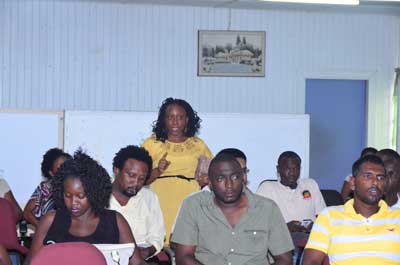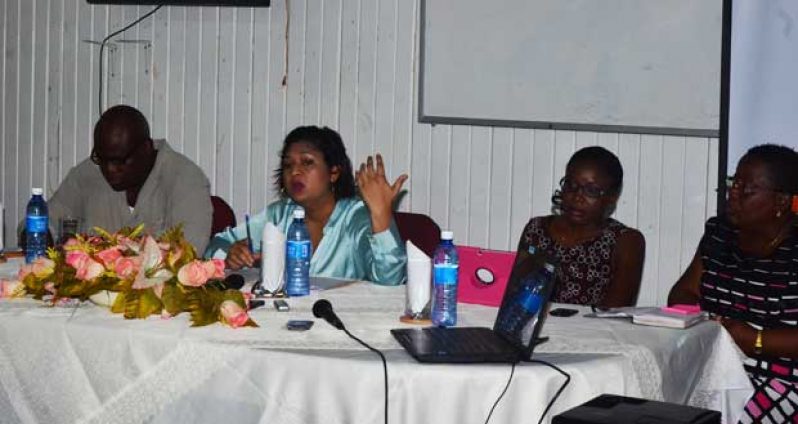THE President’s College (PC) should be an institution reserved for the best performers at the National Grade Six Assessment (NGSA) examination, which determines the placement of students at secondary schools.
Entry to the PC should be restricted to 120 students of the top three per cent of NGSA performers, with allowance being made for one top student from Regions One, Seven, Eight and Nine. And if the 120 students do not want to take up the places offered, as has been the case in many years, and only, for example, 20 students accept their placing, then the school should still be run to cater for those 20 students.

Those were quintessentially the contentions that attracted a robust five-hour exchange between Education Minister Priya Manickchand and a stakeholder group of approximately 20 former PC students on Saturday during a meeting hosted by the Education Minister at the National Centre for Educational Research and Development (NCERD) to hone in on schools’ admission policy.
The recommendations have since raised some level of concern with the Minister, who pointed out that the subvention to PC, where students live in, is presently $180M per year, and it may not be economically prudent to spend that amount of money on 20 students, instead of 120 students per year.
The former students were, however, adamant that the school should be reserved only for the top performers, irrespective of whether the number of children who accept the offer is small.
The Education Minister committed to addressing this recommendation, but made it clear that any change from the current admissions policy would require wide consultations with the parents, students and communities which will be adversely affected.
“If the request here now is to consider rebirthing the admission of only the top two per cent, I cannot do that without talking to the parents and students who are benefiting now. I have a constitutional responsibility to consult with the people who are going to be affected,” she said.
An interesting question that was asked during the consultation was: “Why change the current admissions policy when it benefits a wider cross section of students? This wide cross section of students, for example a student from Mabaruma, would not have had an opportunity to attend a very well-equipped school like PC, because the reality is that Government does not have all the money to equip all the schools with everything they need. Still, these students, once given a chance, do well. So why change what is working for the sake of having another elitist school?”
The premise of the question was rejected, and the old students who recommended a change were adamant that PC needs to be an institution reserved for the best performers.
CURRENT POLICY
The current admissions policy at PC is that all admissions would be done according to marks obtained, places available, cut off scores, and places of residence. All applicants would be ranked for selection according to score, and this year’s cut off score was 491.
According to the policy, a number of resident places would be identified for students of Regions One (Barima/Waini), Seven (Cuyuni/ Mazaruni), Eight (Potaro/Siparuni) and Nine (Upper Takutu/Upper Essequibo).
Available resident places are advertised for students of Regions Two (Pomeroon/Supenaam), Five (Mahaica/Berbice), Six (East Berbice/Corentyne) and 10 (Upper Demerara/Upper Berbice), and the Linden/Soesdyke Highway. Non-residential students from Cummings Lodge to Mahaica would also be allocated places at President’s College.
The old students also called for a review of this policy to allow students from Cummings Lodge to Mahaica to have the option of residency.
Chief Education Officer Mr. Olato Sam, who was part of the panel fielding questions from the stakeholder group, explained that the current policy was put in place during 2009 after the number of students opting to attend PC began to drastically decline.
“We were not able to fill the school with the traditional numbers…the lowest number we had in the lead up to 2009 was 49, when the capacity is 120 in the first year admissions. What we were faced with was a decision on how to fill the school,” he said.
According to him, discussions on viable placement policy led to two scenarios: * One, extend the admissions to the best performing students in all the regions, in addition to the top two per cent; or * Two, have both residential and non-residential students attending, which would both ensure that the 120 first year admissions quota would be met and give an opportunity to students who would not have such an opportunity by setting an applicable benchmark, since the top three per cent were being awarded places at well-equipped schools like Queen’s College (QC) and the Bishops’ High School (BHS) anyway.
Sam said the latter option was decided on.
QUESTION OF INVESTMENT
Several of the old students contended that the reasons for the reduction in the number of students willing to attend PC included infrastructure problems, shortages of teaching staff, and the reduction of the wide range of programmes that were previously offered.
The Minister accepted that the programmes offered then, such as horseback riding, are not being offered now, but she said that the investments in the school have not only continued, but have significantly increased.
She, however, conceded that there appeared to have been some internal management problems with the school.
On the question of shortages of teachers, she noted that all schools, from time to time, have to deal with this challenge; and she made it a point to say that the current ratio of trained teachers to students is one to 35, which is the ideal ratio. She was clear that there are no remarkable shortages at the school.
Relative to the programme content, the Minister acknowledged that there has been some loss, but she was confident that all is not lost; and she pointed out that the nine-month-old Board of Governors was working on restoring this.
She rejected the assertion that infrastructure problems, shortages of teaching staff, and programme content in the school were the sole reasons why students were not taking up the offer to attend PC.
“It was never a question of there being a lack of Government commitment,” the Minister stressed.
Manickchand also pointed out that Guyana’s realities of 2014 have changed from those of 1985, and she said that some of these new realities may have affected parents’ decisions not to send their children to the school.
She said that, in the last few years, a number of top performing students were given the option to attend PC, but decided to attend schools within their own regions.
“This speaks to the investment we have been making across the board. We have developed our schools in regions, and have resourced those schools with facilities, equipment, and trained staff; and children are choosing to stay at schools in their own areas… So it is not one thing,” she said.
She gave the example of the top students for the Caribbean region in 2012 and 2013, who both stayed at schools in Essequibo (Abram Zuil and Anna Regina respectively) instead of taking up places offered to them at the Georgetown schools.
TAKE AWAY
Other issues that came up for discussion were (a): The accomplishments of the Board of Governors since its appointment, which was listed and lauded
(b) Efficient internal management and (c) The opportunity for the PC old students to play a greater role in bolstering the state of the institution.
By the end of the session, and following an appeal by Minister Manickchand for “preconceived notions” to be dispelled, the stakeholder group agreed to the following:
1. That the Minister of Education would review and consult on the recommendation for a review of the admissions policy
2. The Minister of Education would review the policy that non-residential students from Cummings Lodge to Mahaica would also be offered residential places at President’s College, to allow students in this catchment the option of residency
3. That the Minister of Education would publicly announce PC as a national school, as are QC, BHS, St. Stanislaus, St Roses High and St. Joseph High
4. That the Ministry of Education would ensure clearer communication of its policies and decisions
5. That old students of PC can attend the weekly meeting of the Board of Governors with PC teachers, every Thursday at 1.15pm
6. That greater steps would be taken to make PC self-sufficient
7. That the old students would organise themselves in a more efficient manner, as the Government of Guyana would support an old students association that is looking at supporting the school; and
8. That there needs to be a clear definition of where the school should go, academically and in other regards.
Considering the fact that tangible takeaways were agreed on, the Education Minister called for the engagement in the interest of improving PC be a two-sided one.
Manickchand said, “It is easy to say you are interested, but harder to put your money and time where your mouth is. I cannot keep engaging if you are falling down on your job.
“Discussions are great, but you have to properly send criticisms my way, and you have to do more than be critical if you are interested in contributing to PC.
“From the last meeting to now, the old students have not done the things they said they were going to do, and I believe one of the important things that needs to be done is to ensure there is an organised old students association.”
The Minister pointed out that she had deliberately appointed a number of old students to the board, and was very disappointed to see that their attendance rate at board meetings was so low.
(By Vanessa Narine)



.jpg)









